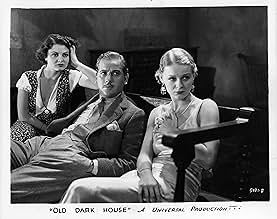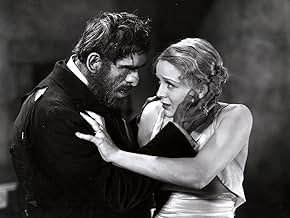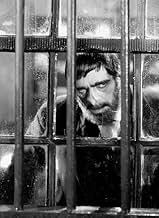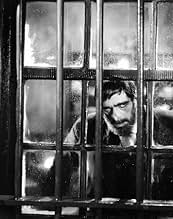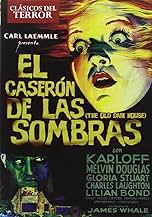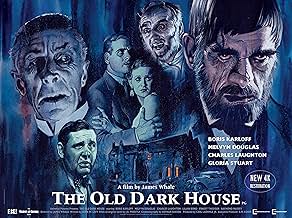CALIFICACIÓN DE IMDb
7.0/10
14 k
TU CALIFICACIÓN
Buscando refugio durante una tormenta, cinco viajeros se encuentran en la propiedad de la familia Femm en una noche extraña y aterradora.Buscando refugio durante una tormenta, cinco viajeros se encuentran en la propiedad de la familia Femm en una noche extraña y aterradora.Buscando refugio durante una tormenta, cinco viajeros se encuentran en la propiedad de la familia Femm en una noche extraña y aterradora.
- Dirección
- Guionistas
- Elenco
- Premios
- 1 nominación en total
- Dirección
- Guionistas
- Todo el elenco y el equipo
- Producción, taquilla y más en IMDbPro
Opiniones destacadas
It's a funny experience when a film evokes déjà vu, only to realize the source of the déjà vu is, itself, intended to itself incite déjà vu. Picture this: a miserable storm sweeps a carload of normal people, as earnest as they are bedraggled, into taking refuge at a spooky old manor, only to be besieged and coveted by the prurient, camp Gothic inmates. But don't do the Time Warp again just yet: at the core of this Russian Doll of horror, pastiche, and dark humour lurks James Whale's oft-overlooked but seldom forgotten mini- masterpiece – The Old Dark House. As Poe-faced as if the script had been quoth by the Raven itself, Whale's film is, if not the granddaddy of most horror clichés, then at least the wry, drunken great-uncle. And, weathered as it is, time has been kind to this one, making The Old Dark House a creepy, clever, and sordidly amusing addition to the pantheon of horror classics. Singing not included; pelvic thrusting barely omitted.
If nothing else, The Old Dark House makes for a fascinating transitional tonal touch-point for Whale, one of the defining masters of classical horror. The film isn't as overtly satirical and camp as Whale's later monster mash-terpieces, The Invisible Man and, especially, Bride of Frankenstein, but it certainly shows him creeping in that direction, with a persistent snicker of irreverent naughtiness under its raspy breath. This isn't to say the film is an outright farce - indeed, Whale runs the gamut of thematic leitmotifs that would proceed to become preoccupations for decades of horror to follow: dogmatic religion, lurid sexuality, class discrepancies, and shunned, disabled family members. Yet, his film crackles with an invigorating, nervy energy, and his characters banter with zingy, pre-screwball fury, with several double-entendres pushing the boundaries of Hays Code knuckle-rapping with cheeky aplomb (maybe Whale assumed American censors wouldn't understand them through the Welsh accents?).
His setup is certainly foreboding enough, with the harried car ride prelude across flooding, lightning-scarred Welsh countryside a perfectly ominous amuse-bouche for the sinister, Gothic castle theatrics to come. Whale's flair for atmospheric mise-en-scène is superb, peppering the film with marvelously spooky flourishes and Expressionist lighting keeping the audience biting their nails throughout (one bit, where a woman makes shadow puppets on the wall with her hands, only to have a dark figure emerge from the shadow, is a jump scare for the ages). But Whale bides his time, keeping his pacing cunningly slow and allowing his film to froth at the mouth with looming tension.
Whale's film is also remarkable for the unprecedented access the audience is given to his cabal of characters. Too many horror films introduce characters as disposable (and disposed of) props, but Whale treats the first half of his potboiler like a theatre piece, as the growing crowd of storm refugees and reluctant hosts meet, and poke hopes, dreams, prejudices, and – mostly – fears out of each other. Whale's ensemble rises to the challenge, delivering genuinely well-crafted and compelling characters, particularly the suave, sharp-tongued Melvyn Douglas, the tough but chipper Lilian Bond, and, especially, Charles Laughton, who gives a remarkably heartfelt performance, his effete bluster whisking away to reveal a man plagued by terrible loneliness underneath. His monologue, revealing his bitter turn to capitalism as a means of finding purpose and escaping past tragedy, is strangely tragic and surprisingly moving amidst the film's tongue-in-cheek tone, and a curious counterpoint to Depression-era cinema's usual propensity for portraying the super-rich as vacuous twits. Ernest Thesiger and Eva Moore deliver masterclasses of brooding as the manor's sister tenants, while title star Boris Karloff is genuinely terrifying, his performance so much more affecting than the mere rage-ravaged riff on his Frankenstein lumbering and grunting you'd initially expect. Finally, Brember Wills gives a performance so deft and daringly over-the-top that he turns horror conventions on their head even while pushing new boundaries of skin-crawling, especially for the 1930s.
Whale's quieter companion piece to his more famous forays into the macabre may tip the cap more at Hitchcock than Mary Shelley, but ably continues his macro theme of humans being far more terrifying than any conventional 'monsters.' The Old Dark House may be humbler in scope, and somewhat more tonally imbalanced than some of its cohort of horror classics (including a swooning romantic subplot that's altogether too saccharine and sincere to play amidst its sardonic surroundings). Still, at a mere 72 minutes, the film is as concise and sardonically sinister as it is creepy, and still a slice of spine-tingling fun for an eerie, rainy night.
-8/10
If nothing else, The Old Dark House makes for a fascinating transitional tonal touch-point for Whale, one of the defining masters of classical horror. The film isn't as overtly satirical and camp as Whale's later monster mash-terpieces, The Invisible Man and, especially, Bride of Frankenstein, but it certainly shows him creeping in that direction, with a persistent snicker of irreverent naughtiness under its raspy breath. This isn't to say the film is an outright farce - indeed, Whale runs the gamut of thematic leitmotifs that would proceed to become preoccupations for decades of horror to follow: dogmatic religion, lurid sexuality, class discrepancies, and shunned, disabled family members. Yet, his film crackles with an invigorating, nervy energy, and his characters banter with zingy, pre-screwball fury, with several double-entendres pushing the boundaries of Hays Code knuckle-rapping with cheeky aplomb (maybe Whale assumed American censors wouldn't understand them through the Welsh accents?).
His setup is certainly foreboding enough, with the harried car ride prelude across flooding, lightning-scarred Welsh countryside a perfectly ominous amuse-bouche for the sinister, Gothic castle theatrics to come. Whale's flair for atmospheric mise-en-scène is superb, peppering the film with marvelously spooky flourishes and Expressionist lighting keeping the audience biting their nails throughout (one bit, where a woman makes shadow puppets on the wall with her hands, only to have a dark figure emerge from the shadow, is a jump scare for the ages). But Whale bides his time, keeping his pacing cunningly slow and allowing his film to froth at the mouth with looming tension.
Whale's film is also remarkable for the unprecedented access the audience is given to his cabal of characters. Too many horror films introduce characters as disposable (and disposed of) props, but Whale treats the first half of his potboiler like a theatre piece, as the growing crowd of storm refugees and reluctant hosts meet, and poke hopes, dreams, prejudices, and – mostly – fears out of each other. Whale's ensemble rises to the challenge, delivering genuinely well-crafted and compelling characters, particularly the suave, sharp-tongued Melvyn Douglas, the tough but chipper Lilian Bond, and, especially, Charles Laughton, who gives a remarkably heartfelt performance, his effete bluster whisking away to reveal a man plagued by terrible loneliness underneath. His monologue, revealing his bitter turn to capitalism as a means of finding purpose and escaping past tragedy, is strangely tragic and surprisingly moving amidst the film's tongue-in-cheek tone, and a curious counterpoint to Depression-era cinema's usual propensity for portraying the super-rich as vacuous twits. Ernest Thesiger and Eva Moore deliver masterclasses of brooding as the manor's sister tenants, while title star Boris Karloff is genuinely terrifying, his performance so much more affecting than the mere rage-ravaged riff on his Frankenstein lumbering and grunting you'd initially expect. Finally, Brember Wills gives a performance so deft and daringly over-the-top that he turns horror conventions on their head even while pushing new boundaries of skin-crawling, especially for the 1930s.
Whale's quieter companion piece to his more famous forays into the macabre may tip the cap more at Hitchcock than Mary Shelley, but ably continues his macro theme of humans being far more terrifying than any conventional 'monsters.' The Old Dark House may be humbler in scope, and somewhat more tonally imbalanced than some of its cohort of horror classics (including a swooning romantic subplot that's altogether too saccharine and sincere to play amidst its sardonic surroundings). Still, at a mere 72 minutes, the film is as concise and sardonically sinister as it is creepy, and still a slice of spine-tingling fun for an eerie, rainy night.
-8/10
Tales about sinister, creepy mansions were already clichéd by the time director James Whale directed THE OLD DARK HOUSE--and instead of presenting the piece as a straight-forward thriller he mixed the film's very atmospheric cinematography with a wild strain of parody. The result is a movie with a bizarre camp humor that foreshadows Whale's slightly later and even more bizarrely camp THE BRIDE OF FRANKESTEIN.
The plot, very based loosely on a J.B. Priestly novel, is perfunctory, existing only to throw together an ensemble cast of already-famous and soon-to-be-famous stars. Five motorists are trapped in the wilds of Wales during a horrific storm and are forced to seek shelter at, of course, an old dark house... but their unwilling hosts are a neurotic Ernest Thesiger, his religious fanatic sister Eva Moore, and their hulking, deformed, and mute butler Boris Karloff. Before the night is over the storm-weary travelers experience everything from a hellish meal to religious lectures--not to mention assault, attempted rape, mysterious cackling, a bit of arson, and a touch of homosexual hysteria (courtesy of Thesiger, Moore, and a surprise male character who is actually played by a woman) thrown in for good measure.
The cast is exceptional; in addition to Karloff, Thesiger, and Moore, we have Melvyn Douglas, Raymond Massey, Charles Laughton, Gloria Stuart, and Lilian Bond, and they wring the most from the covertly wicked script, with Eva Moore ranting about "laughter and sin," Thesiger inviting Raymond Massey into his room "to see a few things," and one of the most socially awkward meals ever put to film. But the film's real power is its cinematography: when they say old DARK house, they really mean it, and the look of the film is just as disorienting for viewers as for the characters; particularly noteworthy is the scene in which Moore lectures Gloria Stuart, with their faces distorted by the bedroom mirror, and the sequence in which Karloff pursues the white-clad and wind-whipped Gloria Stuart with mayhem in mind.
Viewers who expect "Universial Horror" fare will probably be disappointed by THE OLD DARK HOUSE, and director James Whale would create a still more memorable combination of horror and high-camp with THE BRIDE OF FRANKENSTIEN. But THE OLD DARK HOUSE is an overlooked jewel of unusual quality: a sardonic parody of a famous theme, well played, filmed and scripted. Recommended.
Gary F. Taylor, aka GFT, Amazon Reviewer
The plot, very based loosely on a J.B. Priestly novel, is perfunctory, existing only to throw together an ensemble cast of already-famous and soon-to-be-famous stars. Five motorists are trapped in the wilds of Wales during a horrific storm and are forced to seek shelter at, of course, an old dark house... but their unwilling hosts are a neurotic Ernest Thesiger, his religious fanatic sister Eva Moore, and their hulking, deformed, and mute butler Boris Karloff. Before the night is over the storm-weary travelers experience everything from a hellish meal to religious lectures--not to mention assault, attempted rape, mysterious cackling, a bit of arson, and a touch of homosexual hysteria (courtesy of Thesiger, Moore, and a surprise male character who is actually played by a woman) thrown in for good measure.
The cast is exceptional; in addition to Karloff, Thesiger, and Moore, we have Melvyn Douglas, Raymond Massey, Charles Laughton, Gloria Stuart, and Lilian Bond, and they wring the most from the covertly wicked script, with Eva Moore ranting about "laughter and sin," Thesiger inviting Raymond Massey into his room "to see a few things," and one of the most socially awkward meals ever put to film. But the film's real power is its cinematography: when they say old DARK house, they really mean it, and the look of the film is just as disorienting for viewers as for the characters; particularly noteworthy is the scene in which Moore lectures Gloria Stuart, with their faces distorted by the bedroom mirror, and the sequence in which Karloff pursues the white-clad and wind-whipped Gloria Stuart with mayhem in mind.
Viewers who expect "Universial Horror" fare will probably be disappointed by THE OLD DARK HOUSE, and director James Whale would create a still more memorable combination of horror and high-camp with THE BRIDE OF FRANKENSTIEN. But THE OLD DARK HOUSE is an overlooked jewel of unusual quality: a sardonic parody of a famous theme, well played, filmed and scripted. Recommended.
Gary F. Taylor, aka GFT, Amazon Reviewer
Director James Whale and his cast probably had a good time making this film. After the opening credits there's a "producer's note": 'Karloff, the mad butler in this production, is the same Karloff who created the part of the mechanical monster in "Frankenstein". We explain this to settle all disputes in advance, even though such disputes are a tribute to his great versatility.'
So you're know what you're in for, at least modern audiences should. Back then it must have been quite daring to openly "expose" and perhaps even undermine the potential scariness of the film, especially Karloff's role as the butler. I think many executives at Universal frowned upon this as well, in particular Carl Laemmle Sr., but Carl Laemmle Jr. probably shared the same kind of humor as Whale, so they let him get away with it.
The film is very loyal to J.B. Priestley's novel "Benighted" and took most of the wonderful dialogs and one-liners directly from the book. As one would expect from James Whale en co, the sharply written dialog is definitely one of the highlights with the best lines being handed to Thesiger, as in THE BRIDE OF FRANKENSTEIN. This supposedly being a send-up of Universal's horror conventions, it's not particularly engaging as a horror film. Eerie things do happen, absolutely, but they are so bizarre and sometimes so utterly over the top, that you either stop caring about the characters or simply lose track of the proceedings at all. But no complaints about the acting, especially the incomparable Ernest Thesiger who is a standout in a first rate cast. And the sets and photography are absolutely superb as is the whole atmosphere in general, largely due to the continuously (and well timed) stormy soundtrack, which greatly adds to the fun.
Many have pointed out that Whale presents us some kind of parody of the horror movie or some kind of archetypal English household. This seems a very modern, almost anachronistic vision to me. What things did he attempt to mock or make fun of? Essentially THE OLD DARK HOUSE is a well acted sometimes very funny stagy farce with a horror atmosphere at best. He certainly had the last laugh because he probably never intended it that way, although most of the critical acclaim came after his death.
A final note on the Special Collector's Edition DVD: Besides the obligatory stills gallery, nothing of particular interest. A six-minute interview with Curtis Harrington about him saving the original copy of the film. Good thing he did it but that's all we need to know. And truly worthless commentary tracks, James Curtis comments like he's reading a list with all kinds of facts about the movie. Suitable for a booklet, not for an audio commentary.
Camera Obscura --- 8/10
So you're know what you're in for, at least modern audiences should. Back then it must have been quite daring to openly "expose" and perhaps even undermine the potential scariness of the film, especially Karloff's role as the butler. I think many executives at Universal frowned upon this as well, in particular Carl Laemmle Sr., but Carl Laemmle Jr. probably shared the same kind of humor as Whale, so they let him get away with it.
The film is very loyal to J.B. Priestley's novel "Benighted" and took most of the wonderful dialogs and one-liners directly from the book. As one would expect from James Whale en co, the sharply written dialog is definitely one of the highlights with the best lines being handed to Thesiger, as in THE BRIDE OF FRANKENSTEIN. This supposedly being a send-up of Universal's horror conventions, it's not particularly engaging as a horror film. Eerie things do happen, absolutely, but they are so bizarre and sometimes so utterly over the top, that you either stop caring about the characters or simply lose track of the proceedings at all. But no complaints about the acting, especially the incomparable Ernest Thesiger who is a standout in a first rate cast. And the sets and photography are absolutely superb as is the whole atmosphere in general, largely due to the continuously (and well timed) stormy soundtrack, which greatly adds to the fun.
Many have pointed out that Whale presents us some kind of parody of the horror movie or some kind of archetypal English household. This seems a very modern, almost anachronistic vision to me. What things did he attempt to mock or make fun of? Essentially THE OLD DARK HOUSE is a well acted sometimes very funny stagy farce with a horror atmosphere at best. He certainly had the last laugh because he probably never intended it that way, although most of the critical acclaim came after his death.
A final note on the Special Collector's Edition DVD: Besides the obligatory stills gallery, nothing of particular interest. A six-minute interview with Curtis Harrington about him saving the original copy of the film. Good thing he did it but that's all we need to know. And truly worthless commentary tracks, James Curtis comments like he's reading a list with all kinds of facts about the movie. Suitable for a booklet, not for an audio commentary.
Camera Obscura --- 8/10
It's one of director James Whale's most offbeat films along with "Bride of Frankenstein" (IMHO his masterpiece). It's based on the J.B. Priestley novel and it was filmed during the Pre-Code Era. I'd say it's a mixture of horror film, spoof and black comedy...in some aspects it's related to "Arsenic and Old Lace", although it has a darker mood.
On a very stormy night, a group of travelers find shelter in an eerie and scary welsh manor, inhabited by the "weird" Femm family, and there begins a quick chain of events (the film lasts only 72 minutes) until the film's conclusion. The weary and wet travelers include Raymond Massey and Gloria Stuart as a married couple who are traveling through the country with happy-go-lucky friend Mr. Penderel, played by Melvyn Douglas. Other travelers who arrive to this Huge House, are Charles Laughton, playing a rich businessman of humble origins with his lover, Lillian Bond, who's great and very sexy in her role of a joyous chorus-girl.
Then we have the Femms: Religion fanatic Rebecca Femm, who has an obsession with "sinners", expertly played by sinister-looking Eva Moore; her wishy-washy brother Horace Femm, played by the great Ernest Thesiger, who impersonated "Dr. Pretorius" in "Bride of Frankenstein"; 102 years old Sir Roderick Femm, who is played by actress Elspeth Dudgeon, who's listed in the cast as "John" Dudgeon (creepy character!) and "seemingly harmless" psychopath and pyromaniac Saul Femm, played by Brember Wills.
Boris Karloff deserves to be mentioned apart, who impersonates the scarred butler, Morgan, who lusts after Mrs. Waverton (Gloria Stuart), perhaps because she gets to wear a sexy 1930s low-cut dress, the type which pre-Code Jean Harlow wore.
Whale's direction is excellent. I was especially impressed with the shot of the front of the spooky old house in which the Femms reside as seen from the eyes of the passengers in the car. Whale liked to use a subjective camera, which was unusual for many early thirties movies. The camera is the viewer as that viewer moves through the scenes.
Best of all was the late Gloria Stuart's commentary on the Kino DVD, which was excellent. She is such a pleasure to listen to as she reminisces about the movie, and talks all about everyone involved. I never would've known anything about the brilliant actress Eva Moore if it wasn't for her great commentary. She provides so much insight, and is so funny and charming at the same time. She also talks about other things, and other aspects of her career. It's almost like having a conversation with her, she's that relaxed. She speaks very highly of James Whale, and says that he's the best director she ever worked with. She points out different aspects of his filming, especially his use of shadows. She says that making this movie was the high point of her career, and that she never made another movie that she enjoyed working on as much as this one. Take that James Cameron!
Highly recommended.
On a very stormy night, a group of travelers find shelter in an eerie and scary welsh manor, inhabited by the "weird" Femm family, and there begins a quick chain of events (the film lasts only 72 minutes) until the film's conclusion. The weary and wet travelers include Raymond Massey and Gloria Stuart as a married couple who are traveling through the country with happy-go-lucky friend Mr. Penderel, played by Melvyn Douglas. Other travelers who arrive to this Huge House, are Charles Laughton, playing a rich businessman of humble origins with his lover, Lillian Bond, who's great and very sexy in her role of a joyous chorus-girl.
Then we have the Femms: Religion fanatic Rebecca Femm, who has an obsession with "sinners", expertly played by sinister-looking Eva Moore; her wishy-washy brother Horace Femm, played by the great Ernest Thesiger, who impersonated "Dr. Pretorius" in "Bride of Frankenstein"; 102 years old Sir Roderick Femm, who is played by actress Elspeth Dudgeon, who's listed in the cast as "John" Dudgeon (creepy character!) and "seemingly harmless" psychopath and pyromaniac Saul Femm, played by Brember Wills.
Boris Karloff deserves to be mentioned apart, who impersonates the scarred butler, Morgan, who lusts after Mrs. Waverton (Gloria Stuart), perhaps because she gets to wear a sexy 1930s low-cut dress, the type which pre-Code Jean Harlow wore.
Whale's direction is excellent. I was especially impressed with the shot of the front of the spooky old house in which the Femms reside as seen from the eyes of the passengers in the car. Whale liked to use a subjective camera, which was unusual for many early thirties movies. The camera is the viewer as that viewer moves through the scenes.
Best of all was the late Gloria Stuart's commentary on the Kino DVD, which was excellent. She is such a pleasure to listen to as she reminisces about the movie, and talks all about everyone involved. I never would've known anything about the brilliant actress Eva Moore if it wasn't for her great commentary. She provides so much insight, and is so funny and charming at the same time. She also talks about other things, and other aspects of her career. It's almost like having a conversation with her, she's that relaxed. She speaks very highly of James Whale, and says that he's the best director she ever worked with. She points out different aspects of his filming, especially his use of shadows. She says that making this movie was the high point of her career, and that she never made another movie that she enjoyed working on as much as this one. Take that James Cameron!
Highly recommended.
First one carload of normal people who can't go on due to flash flooding stop in a Gothic horror house for food and shelter and then another. Strange doings are happening at the house occupied by the Femm family and their mute servant Morgan.
You can't really say there is any kind of coherent plot to the unfolding events and plot for me is usually the one indispensable part of any film. But in this case I make an exception because obviously Director James Whale was having a little fun with the audience by now used to Universal Studios horror film products. Whale creates a film of dark moods and light banter among the guests who can't quite figure out what's with this family of weirdos.
The Old Dark House marked the American film debut of Charles Laughton and Laughton overacts outrageously as does the whole cast in the role a bluff, overbearing, but essentially good hearted Manchester businessman who's got himself a Sir before his name and is right proud of it. This was also early work for Melvyn Douglas and Raymond Massey as another two of the guests.
Boris Karloff plays the sinister and mute servant Morgan. Karloff had one of the great speaking voices ever in films and interesting that this and his break through role as the Frankenstein monster required no dialog.
The Old Dark House is one great Halloween movie and listen close to the campy dialog that will tickle your funny bone if you don't miss it.
You can't really say there is any kind of coherent plot to the unfolding events and plot for me is usually the one indispensable part of any film. But in this case I make an exception because obviously Director James Whale was having a little fun with the audience by now used to Universal Studios horror film products. Whale creates a film of dark moods and light banter among the guests who can't quite figure out what's with this family of weirdos.
The Old Dark House marked the American film debut of Charles Laughton and Laughton overacts outrageously as does the whole cast in the role a bluff, overbearing, but essentially good hearted Manchester businessman who's got himself a Sir before his name and is right proud of it. This was also early work for Melvyn Douglas and Raymond Massey as another two of the guests.
Boris Karloff plays the sinister and mute servant Morgan. Karloff had one of the great speaking voices ever in films and interesting that this and his break through role as the Frankenstein monster required no dialog.
The Old Dark House is one great Halloween movie and listen close to the campy dialog that will tickle your funny bone if you don't miss it.
¿Sabías que…?
- TriviaThis was Boris Karloff's first credited starring role. His name had been left off the Frankenstein (1931) publicity packages and only credited in the end credits of that film.
- ErroresOne of Gloria Stuart's elaborate earrings is missing about mid-film, it reappears for 2 close up shots and disappears again in medium and long shots.
- Citas
Rebecca Femm: [feels the fabric of Margaret Waverton's low-cut gown] Fine stuff, but it'll rot.
Rebecca Femm: [touches Margaret's skin above the neckline] Finer stuff still, but it'll rot too!
- Créditos curiososBefore the Universal Pictures logo: PRODUCER'S NOTE: - Karloff, the mad butler in this production, is the same Karloff who created the part of the mechanical monster in "Frankenstein". We explain this to settle all disputes in advance, even though such disputes are a tribute to his great versatility
- ConexionesEdited into Pale Moonlight Theater: The Old Dark House (2015)
- Bandas sonorasSingin' in the Rain
(uncredited)
Music by Nacio Herb Brown
Lyrics by Arthur Freed
Sung by Melvyn Douglas a cappella, with modified lyrics
[Penderel sings the song in the car as the he and the Wavertons make their way on the washed out road]
Selecciones populares
Inicia sesión para calificar y agrega a la lista de videos para obtener recomendaciones personalizadas
Detalles
- Fecha de lanzamiento
- País de origen
- Idioma
- También se conoce como
- The Old Dark House
- Locaciones de filmación
- Productora
- Ver más créditos de la compañía en IMDbPro
Taquilla
- Total en EE. UU. y Canadá
- USD 25,678
- Total a nivel mundial
- USD 34,649
- Tiempo de ejecución
- 1h 12min(72 min)
- Color
- Relación de aspecto
- 1.37 : 1
Contribuir a esta página
Sugiere una edición o agrega el contenido que falta



